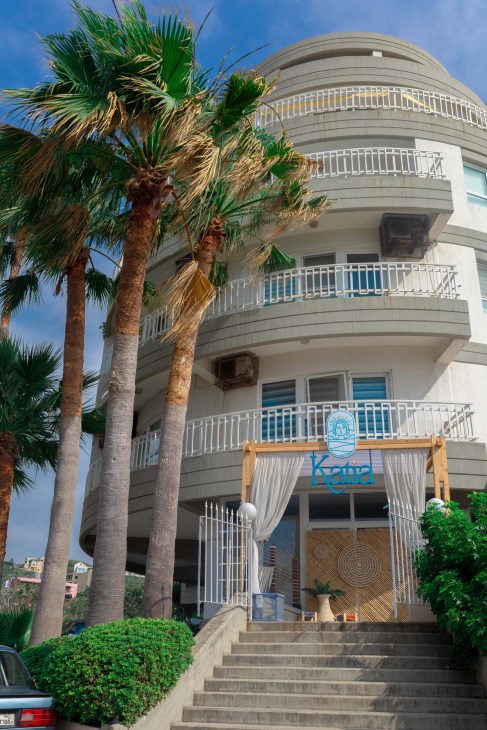Beirut’s beach clubs are back and buzzing with optimism
After weathering the storms of economic crisis and regional instability, Lebanon’s capital is hopeful about a lasting revival as visitors – and investors – return.
On a Saturday afternoon in June, the soundtrack at the newly opened Katia beach club in Monsef, north of Beirut, is mellow. Sunshades flutter, cocktails sweat in the sun and the sea sparkles. All of this would be unremarkable around much of the Mediterranean but it wasn’t long ago that Lebanon was staring into an abyss of instability. Katia’s founder, Nabil Massoud, surveys the scene from the edge of the terrace. “We’ve been fully booked since we opened,” he says, sounding somewhat surprised. “People want to feel normal again – to enjoy the sea, music, family and life.”
For Lebanon’s beach clubs, the past few years have been far from normal. An economic collapse in 2019 caused the lira to lose more than 90 per cent of its value by 2023. Then came the coronavirus pandemic, shuttering hotels and pushing beloved restaurants to the edge of ruin. In 2020 the Beirut port explosion turned crisis into catastrophe. When venues tried to reopen in 2023, regional war made the coastline feel like a front line.

“After the explosion, 80 per cent of the industry collapsed,” says Kinda Mourani, the managing partner of Orchid, which operates several of the country’s best-known beach clubs. “People were scared to stay in Lebanon.” Her team at Orchid found itself in a near-constant state of flux. “One moment you’d be planning a party; the next you were cancelling it because of another crisis. Instability kills momentum.”
But something has changed this summer and sunseekers are hitting Lebanon’s beaches in droves. Despite the disruption of flights to Beirut in the wake of the Israel-Iran conflict, Gulf tourists are returning and bookings at coastal hotels are up. Meanwhile, the Lebanese diaspora is coming home for the summer, keen to reconnect. Lebanon has a government in place for the first time in years and the fighting that roiled Beirut in 2023 is largely over. In seaside towns such as Batroun, there’s talk not just of reopening but of reinvention.
“There’s a wave of cautious hope,” says Charbel Mhanna, the CEO of Dubai’s Blackspoon group. “Hotels are full and investment is coming back. People are rebuilding.” In 2024, Mhanna opened the Batroun outpost of his beach restaurant Ibn Al Bahr but shuttered it months later after Israel and Lebanon-based paramilitary group Hezbollah went to war. “People were dying a few kilometres away,” he says. “It didn’t feel right to be serving seafood and playing music. Even after we closed, people kept asking when we’d return. That connection is what brought us back.”


The restaurant’s reopening in May was met with a full house on the first weekend. “It’s emotional for me,” he says. “This isn’t a business that you can approach with a five-year plan. You have to live it day by day. Lebanon has taught us how to operate in chaos.” The challenge, he says, is to build something resilient in a market that often feels anything but. “There’s no currency stability, no clear policy. But there is a spirit. Lebanese people don’t just bounce back – they sprint.”
DJ and entrepreneur Nazir Bassit owns several venues and is preparing to launch a new beach club. “After coronavirus and the economic crash, the big clubs died,” he says. “People moved to speakeasies, small bars, underground stuff. But there’s a boom again. The demand is huge. As a DJ, I’m fully booked all summer.”
Bassit is aware of how fragile hope can be. “When we get close to normality, we’re often knocked back,” he says. In the past, summers of revival have given way to autumns of uncertainty. “But this season, the energy feels more real,” he says. Indeed, there’s a new depth of investment – both financial and emotional. Entrepreneurs seem to be aiming not for quick wins but for permanence. “The beach club scene is now less about flash and more about feeling,” says Mourani. “It’s about creating a space where people feel safe and proud to be here.” In Monsef, Massoud tells Monocle what he hopes to achieve with Katia. “This isn’t just about business,” he says. “It’s about restoring a way of life and showing the world that Lebanon is still here.”
Tide shift in Bahrain
Across the Arabian Peninsula, a wave of investment is reimagining Bahrain’s coastline. As part of the kingdom’s economic recovery plan, launched in 2021, tourism and lifestyle infrastructure is being pushed to the fore. The flagship development is Bilaj Al Jazayer, a 3km public beach on the southwestern coast. Next year, the area will welcome Azure Beach Bahrain, a beach club developed by Edamah, Bahrain’s sovereign property arm, in partnership with Dubai’s Sunset Hospitality Group. Elsewhere, Marassi Galleria near Diyar Al Muharraq promises a blend of hospitality, retail and dining.
Bahrain isn’t known for its beach scene and has long had a somewhat subdued reputation, especially compared to the uae or Qatar. But this might be a turning point. There remain challenges – from a fragmented coastline to high summer humidity – but the island kingdom’s new beach clubs could offer something that the region often lacks: elegance without excess. It’s a gentle revival but a timely one.


